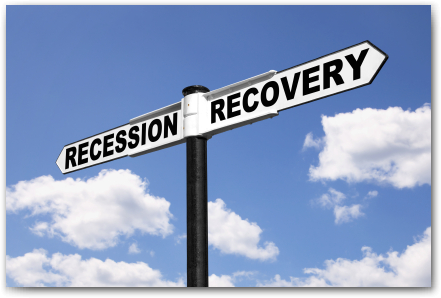Most financial analysts claim our country’s economy is on the mend, but many people haven’t felt that yet. Maybe you’re one of these folks. If so, there are a few basic steps you can take to speed up your personal recovery.
1. Make (and stick to) a budget

A budget isn’t a straight jacket for your wallet. It’s a plan for your mind, to help you be sure the things you spend your money on are the things you want or need most. Small amounts pile up. A daily coffee shop visit adds up to $100+ a month. Then there’s eating out, movies, alcohol, cigarettes, lotto tickets – you get the idea. When you spend money, write it down. Review your spending weekly, so you know where your money is going. Look for things you can cut.

For example, buy your meals the old fashioned way – at the grocery store, not the drive-thru. And do most of your shopping around the perimeter of the market – near the outside walls. This is where you’ll find the fresh produce, dairy, and meats/poultry. Cut your food bill in half by avoiding pre-cooked or ready-to-eat stuff.
2. Consider ways to downsize
Do you really need all 200 cable channels? In fact, do you really need cable at all? You can buy a great HDTV roof-top antenna for $70 from most hobby electronics stores. Compare that to the cost of one month’s cable service.
Consider downgrading your cell phone plan. Somehow, your grandparents made do with no cell phone at all.
Don’t overlook your library. It’s got more than just books. You’ll find everything from the daily newspaper to your favorite magazines, audio books, movies, music CDs, and more. And it’s all free.
When’s the last time you left the car at home and took the bus? Or rode a bike? Or walked?
Are you too proud to be seen in a thrift shop? Too bad, because Goodwill, the Salvation Army, and all manner of local used clothing and used furniture shops have decent, quality treasures among the junk – at near give-away prices. (But experts recommend not buying used mattresses or shoes.)
3. Attempt to renegotiate your bills
Creditors want you to pay your bills. Banks, finance companies, credit card companies, the IRS – they all would rather have you paying something than nothing. The biggest mistake you can make is not talking to them. Most things are negotiable, but not if they have to track you down. So call them, the sooner the better. When you call, have an idea of what you can realistically afford to pay each month. Explain your situation, and ask them to work with you. Ask for a supervisor, if necessary. Be persistent but nice. Write down who you talked to and when. That way, if you ever have to explain your situation to a judge, you’ve got names and dates.
4. Learn the art of regifting
Popularized on Seinfeld (“The Label Maker” episode), regifting is taking a gift that you received and giving it to somebody else. Just remember the three commonsense regifting rules: Rewrap the gift, don’t regift used items, and – most important – keep careful records, so you don’t give the gift back to the original gift-giver.
5. Be pro-active and flexible
If you’re waiting for a rescue boat, you may have a very long wait. If you’re out of work, leverage your relationships. Don’t be afraid to let people know about your job search. If you’re a good worker, people will want to help. Look for employment opportunities and position yourself to take advantage of them. Broaden your employment horizons. This isn’t necessarily a time for the job you want to do; it’s a time for the job you need.
6. Consider taking out a dividend-paying whole life insurance policy
Dividend-paying whole life insurance not only provides your family much-needed peace-of-mind, it’s a liquid asset in times of crisis. The premiums you pay into a dividend-paying whole life insurance policy build up a cash value account you can access as needed.
Look into policies where at least half of your premium is directed into a “Paid Up Additions Rider, “ which grow your cash value up to 40 times faster than a traditionally designed policy and pay the agent 50-70% less commission.
7. Think positive and remain calm
Getting down in the dumps is not for you. Nobody wants to help a sourpuss. A positive mental attitude is your choice. If you have food in the refrigerator, clothes on your back, a roof overhead and a place to sleep, you are more comfortable than 75% of the world’s population
Use your library – and your librarian – to find books and articles that can help you increase your mental health, as well as your financial health.
You will beat the recession. And if you’re interested in learning more about dividend-paying whole life insurance, check out the Bank On Yourself benefits page.


Speak Your Mind